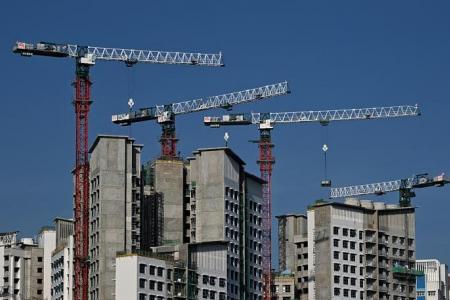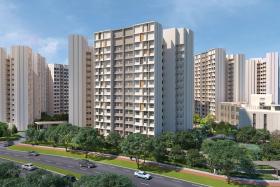More inspections, stiffer penalties after four deaths at HDB work sites this year
The Housing Board, which is Singapore's largest housing developer, has imposed harsher punishments for safety lapses through a stricter demerit points system that took effect from July 1, The Straits Times has learnt.
This comes after four fatal accidents at HDB work sites since the start of this year.
There were also two dangerous occurrences - incidents that could cause serious injury and death, but in which no one was hurt - according to a circular issued in June by Mr Goh Keng Cheong, deputy director of HDB's construction safety management section.
The number of workplace injuries at HDB sites has also risen and now exceeds pre-Covid-19 levels, said Mr Goh, who flagged unsatisfactory safety provisions and housekeeping at some work sites.
Some contractors continue to have the same types of safety lapses despite repeated reminders, he added.
With the stricter demerit points system, the administrative charges levied by HDB on errant contractors have now been doubled.
Companies have to pay what is essentially a fine of $30,000 for accidents leading to death, or injury to the public, and $20,000 for serious incidents, such as those leading to amputation or permanent disability - up from $15,000 and $10,000 previously.
Under the stricter system, the number of demerit points given for serious incidents, as well as for critical non-compliances observed during safety audits, has also risen.
These critical non-compliances are safety lapses that could lead to imminent danger, or if more than 15 lapses are found during an audit.
Contractors incur between 10 and 100 demerit points depending on the severity of the workplace accident or the safety lapses found. If they accumulate 100 points, they will be barred from tendering for HDB projects for three months.
Work sites that perform poorly will also be subject to close monitoring for at least three months, with safety audits conducted monthly.
In a note to contractors and consultants on July 29, HDB deputy chief executive of building Johnny Wong said the stricter demerit points system is meant to ensure that all contractors take safety seriously.
"With the easing of the Covid-19 restrictions and reopening of the economy, we understand everyone is working hard to deliver projects on time," he added.
"I would like to reiterate that HDB will not hesitate to take strong punitive actions against our contractors for any lapses found during our audit inspections," he said.
There are close to 100 Build-To-Order (BTO) projects currently under construction.
Lengthy delays had plagued many of them as a result of Covid-19, but work has now picked up, and HDB said it expects all BTO projects that have been prolonged by the pandemic to be completed in two to three years.
In response to queries from ST, HDB said: "As we work to reduce these delays as much as possible, HDB constantly emphasises to our consultants, contractors and suppliers that quality and safety should never be compromised.
"Our industry partners are thus aware that safety is of paramount importance, and any death or serious injury at HDB work sites and projects is one too many."
To strengthen the culture of safety, HDB is conducting more sharing sessions for site supervisors and workers. It also conducts regular inspections targeting higher-risk areas, such as the use of machinery and working at heights.
These are on top of the inspections carried out separately by the Ministry of Manpower.
Mr Gregory Lin, general manager of construction firm Ken-Pal, which is working on two HDB projects, said the stricter system serves as a good deterrent.
More effective has been the more frequent checks conducted recently, not only by HDB but also by its consultants, which has helped to keep everyone on their toes.
Said Mr Lin: "As main contractors, we don't want anything bad to happen at our sites, and we definitely don't want heavier penalties. We believe in a more collaborative approach, where we work with the consultants and our client HDB to prevent accidents from occurring."
Mr Han Wenqi, a registered workplace safety and health officer, said HDB's efforts show a commitment to drive change.
He added: "If they strengthen the frequency and intensity of their enforcement on site, I think it will be sustainable."
Get The New Paper on your phone with the free TNP app. Download from the Apple App Store or Google Play Store now


